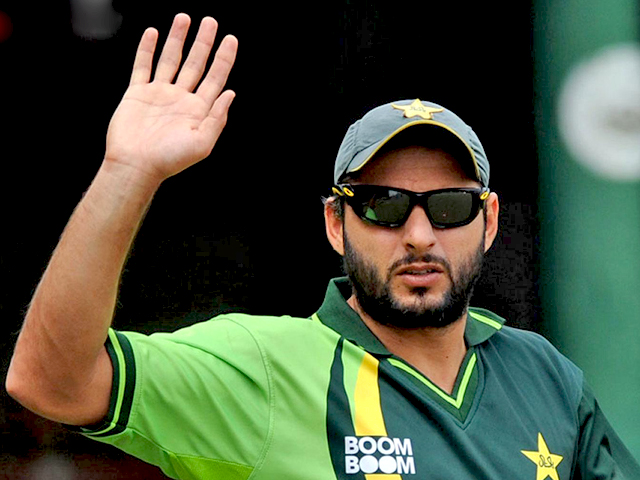Karachi, Sep 17: Shahid Afridi returned as Pakistan’s Twenty20 captain on Tuesday and then announced that he was looking forward to leading a team of “lion-hearted cricketers” to international laurels including the next T20 World Cup in 2016.
 The flamboyant all-rounder has replaced Mohammad Hafeez, who stepped down as skipper earlier this year after Pakistan failed to reach the T20 World Cup semi-finals in Bangladesh.
The flamboyant all-rounder has replaced Mohammad Hafeez, who stepped down as skipper earlier this year after Pakistan failed to reach the T20 World Cup semi-finals in Bangladesh.
In addition, the Pakistan Cricket Board (PCB) has reaffirmed that Misbah-ul-Haq will continue to captain Pakistan in Tests and One-day Internationals till next year’s ICC World Cup in Australia and New Zealand.
“In line with my policy of taking decisions democratically I consulted Cricket Committee and my Board members before announcing these decisions. I wish both Afridi and Misbah very good luck in their upcoming assignments,” PCB chairman Shaharyar Khan said in the statement.
Chosen ahead of young contender Sohaib Maqsood primarily because of his vast experience, Afridi stressed that he would lead by example and put the country’s underachieving Twenty20 team on the victory path.
“I’m honoured to get national captaincy again,” he told ‘The News’ in an interview soon after PCB announced that Afridi has been installed as the T20 captain till the 2016 edition of the Twenty20 World Cup.
“It’s an exciting responsibility and the fact that the team management is backing my completely gives me great confidence,” he said.
Afridi made it clear that as captain he would not live with “chicken-hearted” players and would instead support boys exhibiting a “lion-hearted approach”.
“As (Twenty20) captain my message to the players would be simple: don’t be scared of failure,” he said.
“There is no place for chicken-hearted players in the Twenty20 format. You need a lion-hearted approach and that’s what I intend to promote in our team,” he added.
Pakistan reached the final of the inaugural Twenty20 World Cup in South Africa and then went on to win the coveted title two years later in England. But since then Pakistan’s performance graph in the tournament has dipped.
Afridi believes that unlike the past when Pakistan were among few teams with plenty of expertise in the slam-bang format, other sides have really caught up.
“Winning Twenty20 matches isn’t easy for us anymore,” he said. “Other teams have gradually learned how to flourish in this format and have hence improved.”
But Afridi was quick to make it clear that under his command Pakistan would be one of the major contenders for the T20 World Cup in 2016.
“We have a good Twenty20 team and all we need is to show that killer instinct needed to win major tournaments,” he said.
Afridi was Pakistan’s hero in their title-winning triumph in 2009 when he produced match-winning performances in the semifinal and final.
But his personal stats have taken a hit in recent times and Afridi is fully aware of it.
“I need to regain my form both with the bat and ball,” he said. “As captain I know that I will have to lead by example because that’s the only way you can get the best out of the players.”
Afridi, 34, was forced to give up captaincy in the summer of 2011 following a public spat with team coach Waqar Younis and the then PCB chairman Ijaz Butt.
Butt is long gone but Waqar is back in the saddle as national coach. However, Afridi is certain that what happened in 2011 following Pakistan’s World Cup semi-final defeat against India would not get repeated in the future.
“What happened in the past stays in the past,” he said. “I would want to focus on the present and as far as Vicky bhai (Waqar) is concerned I must say that he is a changed man and I’m enjoying working with him,” he added.
During his previous stint as captain, Afridi captained Pakistan in 19 Twenty20 Internationals between August 2009 and April 2011. Pakistan won eight and lost 11 matches under his captaincy.
He is one of the most capped players in the Twenty20 format and also one of its most accomplished. In 74 appearances, Afridi has accumulated 1112 runs at an average of 19.17 and a strike rate of 144.04. He has also bagged 77 wickets at 22.61. Over the last 12 months, he has taken 10 wickets at an average of 26.80 in 11 matches and scored 173 runs at a strike rate of 150.
Afridi will begin his latest stint as captain with a one-off Twenty20 International against Australia in Dubai on October 5.





Comments
Add new comment